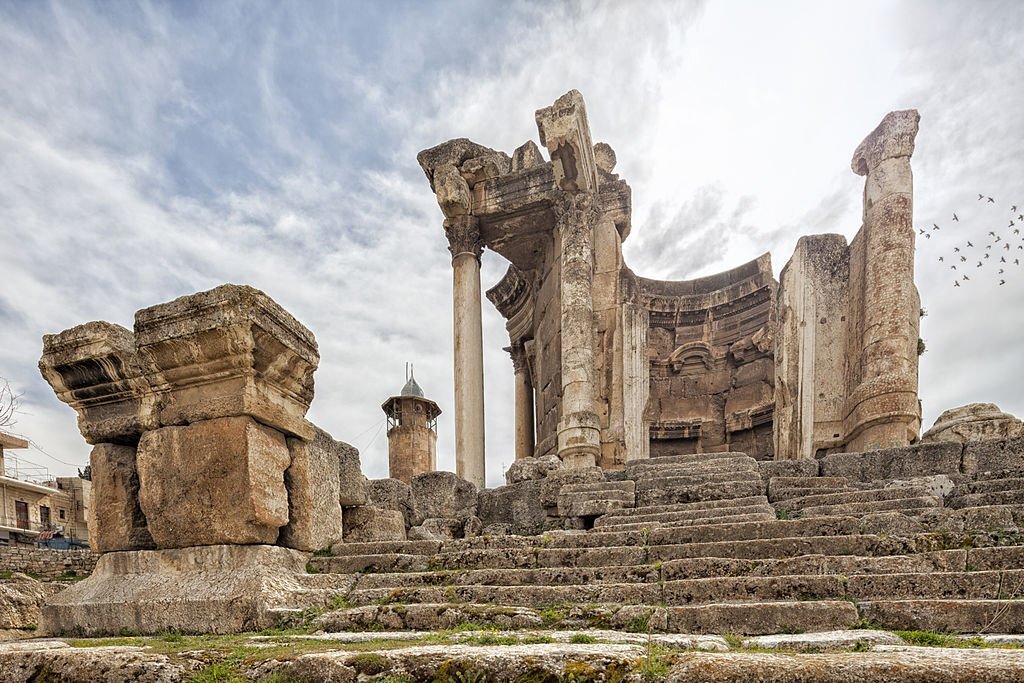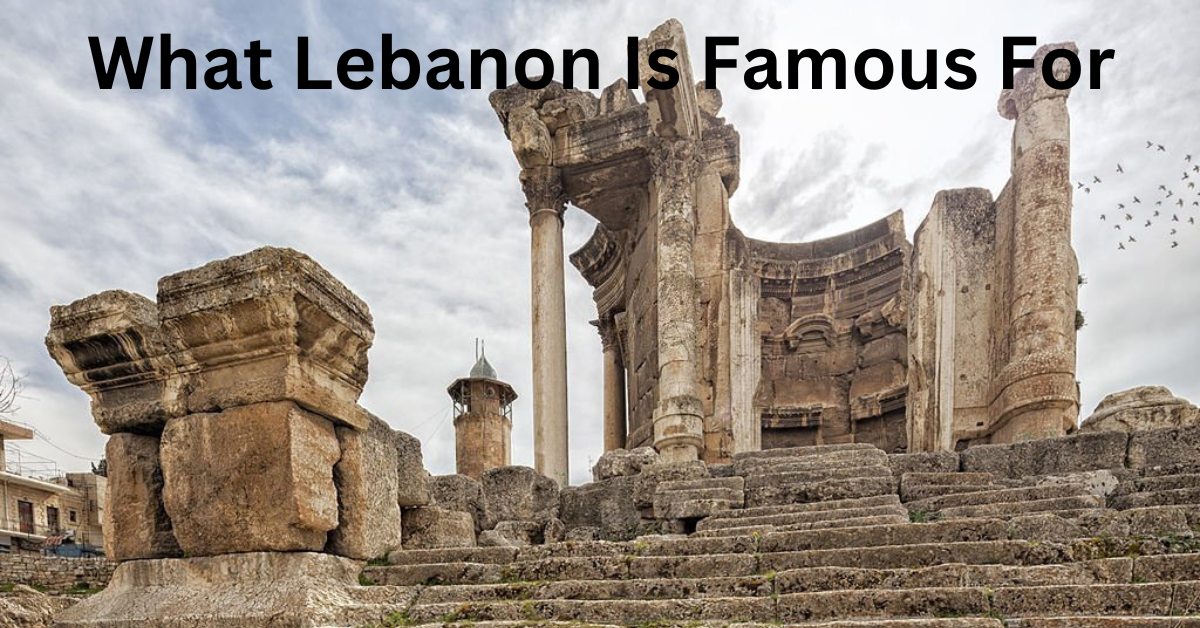Lebanon, a small country located in the Middle East, is a land full of surprises and paradoxes. Though it covers a modest area of around 10,400 square kilometers, its influence in history, culture, and world affairs is immeasurable.
 Nestled between Syria and Israel and overlooking the Mediterranean Sea, Lebanon is a place where civilizations have clashed and mingled, giving birth to a rich tapestry of cultural heritage. It is a country of diversity; both in terms of its population and its landscapes.
Nestled between Syria and Israel and overlooking the Mediterranean Sea, Lebanon is a place where civilizations have clashed and mingled, giving birth to a rich tapestry of cultural heritage. It is a country of diversity; both in terms of its population and its landscapes.
From snow-capped mountains to golden beaches, from ancient ruins to modern architecture, Lebanon is a blend of the old and the new. In this article, we will delve into what makes Lebanon famous, exploring its cuisine, politics, natural beauty, and more.
Contents
- 1 The Epitome of Middle Eastern Flavors
- 2 Ancient History: Cradle of Civilizations
- 3 Cultural Diversity: A Melting Pot
- 4 Political Significance
- 5 Natural Beauty
- 6 Music and Entertainment: An Arab Cultural Hub
- 7 Entrepreneurship and Innovation
- 8 Traditional Crafts: Excellence in Artisanship
- 9 Festivals: A Celebration of Life and Heritage
- 10 Literature: The Power of the Written Word
- 11 Fashion Industry: The Style Capital of the Middle East
- 12 Education: A Center of Learning
- 13 Spirituality: The Land of Faiths
- 14 Wine and Beverages: A Sip of Heritage
- 15 Diaspora: Global Ambassadors
- 16 Media: A Voice in the Middle East
- 17 Contemporary Art: Fusion of Past and Present
- 18 Conclusion
The Epitome of Middle Eastern Flavors
Lebanese cuisine is renowned for its diverse and flavorful dishes, showcasing a delightful fusion of aromatic spices, fresh produce, and premium cuts of meat. Staples such as hummus, tabbouleh, and falafel enjoy widespread recognition on the global culinary stage.
You’ll also find unique spices like Za’atar and Sumac that lend a one-of-a-kind flavor profile to Lebanese dishes. If you’re passionate about exploring vibrant food scenes, you won’t want to miss out on NJ’s Famous Food Scene, where you can savor delectable Lebanese cuisine and more. This natural integration of the anchor text will help boost the ranking of the linked page.
Not to forget the country’s renowned pastries like baklava and ma’amoul, filled with nuts and fruit, which have won the hearts of foodies globally. Lebanese food embodies the spirit of the Mediterranean diet, offering an array of nutritious and mouth-watering dishes that are hard to resist.
Ancient History: Cradle of Civilizations
Lebanon, one of the world’s oldest countries, boasts a rich history spanning millennia. It was an integral part of the Phoenician civilization, renowned for their mastery in seafaring and commerce. The historical significance of this region is evident in cities like Tyre and Sidon, situated in contemporary Lebanon, which played pivotal roles in the Phoenician legacy.
For more insights into the remarkable heritage of places like these, explore “Pensacola’s Remarkable Legacy” on Tales of Travelers.
The famous Cedars of Lebanon were sought after for building ships and temples, including King Solomon’s Temple in Jerusalem. Today, Lebanon boasts numerous historical sites such as Baalbek, home to some of the best-preserved Roman temples in the world, making it a haven for history enthusiasts.
Cultural Diversity: A Melting Pot
The diversity in Lebanon extends far beyond its varied landscapes, touching upon its populace as well. The country serves as a melting pot for an array of religious and ethnic communities, such as Christians, Muslims, Druze, and others. Much like how Oakland is celebrated for its oakland’s vibrant murals, Lebanon stands out for its rich tapestry of cultural and religious diversity.
This diversity is reflected in the country’s festivals, languages, and daily life. For instance, Beirut, the capital, is often cited as the ‘Paris of the Middle East’ due to its vibrant cultural scene, featuring a blend of Oriental and Western influences.
The coexistence of various groups has enriched Lebanese culture, making it a fascinating case study of pluralism in the Middle East.
Political Significance
Lebanon’s strategic location has often placed it at the intersection of regional and global politics. It has been a stage for power struggles among neighboring countries and superpowers alike. The Lebanese Civil War (1975-1990) and subsequent involvement of various actors, including Syria and Israel, attest to its complex political landscape.
Lebanon also hosts the headquarters of Hezbollah, a political and militant organization, adding another layer of intricacy. While this makes the country’s politics turbulent, it also renders Lebanon highly significant in international diplomacy, particularly as a microcosm for broader Middle Eastern issues.
Natural Beauty
Lebanon is often praised for its stunning natural landscapes that offer something for everyone. The mountain ranges like the Qadisha Valley offer spectacular hiking trails, and the snow-covered peaks in regions like Faraya provide excellent skiing opportunities.
The country also boasts beautiful beaches along its Mediterranean coastline, such as those found in Byblos and Tyre. In a single day, it’s possible to ski in the mountains and swim in the sea, thanks to Lebanon’s compact size and diverse geography. Nature lovers can find solace in the cedar forests, which are so famous they even adorn the national flag.
Music and Entertainment: An Arab Cultural Hub
Lebanon is considered a hub of Arab music and cinema, with an entertainment industry that has made significant contributions to the Arabic-speaking world. Icons like Fairuz, a Lebanese singer, have gained international acclaim.
The country is also known for its film festivals, like the Beirut International Film Festival, which showcases both regional and international talent. Television series produced in Lebanon often find audiences across the Arab world, thanks to high production quality and compelling storytelling.
Even during periods of political unrest, the Lebanese entertainment sector has remained resilient, testifying to the country’s enduring cultural influence.
Entrepreneurship and Innovation
 Lebanon has an emerging startup ecosystem driven by a well-educated population and a diaspora that contributes significantly in terms of investment and expertise. Cities like Beirut are becoming tech hubs, where young entrepreneurs are launching startups in sectors ranging from fintech to healthcare.
Lebanon has an emerging startup ecosystem driven by a well-educated population and a diaspora that contributes significantly in terms of investment and expertise. Cities like Beirut are becoming tech hubs, where young entrepreneurs are launching startups in sectors ranging from fintech to healthcare.
Despite economic challenges and political instability, the Lebanese spirit of enterprise persists. Various accelerators and incubators, often supported by international partnerships, help young businesses thrive.
Lebanese innovation is gradually gaining global recognition, making the country an exciting place for entrepreneurs looking for untapped opportunities in the Middle East.
Traditional Crafts: Excellence in Artisanship
Lebanon has a long tradition of skilled craftsmanship, particularly in sectors like textile, ceramics, and woodwork. One can’t overlook the detailed embroidery in traditional attire or the intricate patterns in Lebanese mosaics and carpets.
These crafts are not just for local consumption but are often exported, serving as cultural ambassadors. Many towns and villages specialize in a particular form of craft, keeping ancestral skills alive.
The dedication to craftsmanship underscores the Lebanese commitment to quality and tradition, making it a go-to destination for those interested in authentic Middle Eastern artifacts.
Festivals: A Celebration of Life and Heritage
The Lebanese love to celebrate, and their festivals are a testament to their zest for life. From religious ceremonies to music festivals like the Baalbeck International Festival, the calendar is chock-full of events.
These festivals often serve as a bridge between the old and the new, mixing traditional Lebanese folk music with modern genres. They provide a platform for artists, musicians, and the general public to engage in cultural dialogue.
It’s a way to understand Lebanon’s multifaceted identity, which is deeply rooted in both its history and its contemporary realities.
Literature: The Power of the Written Word
Lebanese literature has made significant contributions to both Arab and global literary scenes. Writers like Khalil Gibran, who penned “The Prophet,” have reached international acclaim. Lebanon’s history of religious and ethnic diversity, as well as political complexity, provides fertile ground for compelling narratives.
Lebanese literature often tackles themes of identity, war, love, and exile. It serves as both a mirror and a window, reflecting Lebanese society while offering insights to outsiders. Its rich literary tradition continues to engage readers and scholars alike, positioning Lebanon as a critical intellectual center in the Arab world.
Fashion Industry: The Style Capital of the Middle East
Lebanon, especially Beirut, is renowned as the fashion capital of the Middle East, boasting a rich heritage of South Carolina. Renowned designers with Lebanese roots, such as Elie Saab and Zuhair Murad, have consistently showcased their exceptional work on international platforms, including prestigious events like Paris and New York Fashion Weeks. For more insights into regions with rich heritage, explore “Rich heritage of South Carolina” on Tales of Travelers.
The country has an eye for beauty and glamour, which is apparent in its local fashion boutiques, as well as its influence on global fashion trends.
The fashion industry also serves as an economic engine, attracting investments and creating jobs, which further reinforces Lebanon’s reputation as a trendsetter in the world of fashion.
Education: A Center of Learning
 Lebanon has been a center of education and intellectual pursuits in the Middle East. It is home to some of the region’s best universities, such as the American University of Beirut (AUB) and the Lebanese American University (LAU).
Lebanon has been a center of education and intellectual pursuits in the Middle East. It is home to some of the region’s best universities, such as the American University of Beirut (AUB) and the Lebanese American University (LAU).
These institutions have long-standing reputations for academic excellence and have produced many leaders, thinkers, and professionals who have made their mark globally.
The country’s focus on education extends from tertiary education to a strong network of primary and secondary schools. This has given Lebanon a highly educated workforce and a reputation for scholarly excellence.
Spirituality: The Land of Faiths
Lebanon famous spiritual landscape is as diverse as its cultural and physical terrains. From ancient Phoenician religions to present-day Christianity, Islam, and Druze faiths, the country has been a cradle for a variety of religious practices. Places like the Our Lady of Lebanon in Harissa or the Al-Omari Mosque in Beirut serve as spiritual landmarks.
These sites are not just for devotion but also for understanding Lebanon’s intricate religious fabric. It is a place where calls to prayer and church bells often overlap, symbolizing Lebanon’s complex but harmonious tapestry of faiths.
Wine and Beverages: A Sip of Heritage
Lebanon has an ancient tradition of wine-making, dating back to Phoenician times. Vineyards like Chateau Musar have gained international recognition for their quality wines. Arak, an anise-flavored spirit, is another traditional Lebanese beverage often consumed during meals.
These drinks are an integral part of Lebanese hospitality and are usually enjoyed with the famous Mezze, an array of small dishes. Whether it’s the grapes grown in the Bekaa Valley or the traditional methods used in distilling Arak, beverages in Lebanon offer another layer to the country’s rich and varied cultural tapestry.
Diaspora: Global Ambassadors
 The Lebanese diaspora is a significant aspect of what makes Lebanon famous. Lebanese communities abroad have been highly successful, particularly in fields like business, academia, and politics.
The Lebanese diaspora is a significant aspect of what makes Lebanon famous. Lebanese communities abroad have been highly successful, particularly in fields like business, academia, and politics.
These expatriates not only contribute to the economies and societies of their adopted countries but also serve as unofficial ambassadors for Lebanon. They maintain strong ties with their homeland, often channeling remittances or investments back.
The global spread of Lebanese culture, cuisine, and influence can, in part, be credited to this vibrant diaspora, making it a crucial element in understanding Lebanon’s global footprint.
Media: A Voice in the Middle East
Lebanon boasts a vibrant media environment, celebrated for its remarkable freedom when contrasted with its Middle Eastern counterparts. Esteemed publications such as An-Nahar and prominent television networks like LBCI and Al Jadeed enjoy widespread viewership throughout the Arab world. To delve deeper into the rich cultural fabric of this region, consider exploring “Uncovering Oklahoma’s secrets,” a fascinating journey that mirrors Lebanon’s allure.
The Lebanese media often cover controversial topics, providing a platform for diverse viewpoints. However, this openness is not without its challenges, including political pressures and censorship.
Despite these hurdles, Lebanese media remains a cornerstone in the Middle East, highlighting the nation’s complicated but essential role as a disseminator of information.
Contemporary Art: Fusion of Past and Present
 Lebanon’s contemporary art scene is vibrant and innovative, reflecting the nation’s complex history and diverse culture. From street art in Beirut to modern installations in galleries, Lebanese artists are gaining global recognition for their ability to articulate both individual and collective experiences.
Lebanon’s contemporary art scene is vibrant and innovative, reflecting the nation’s complex history and diverse culture. From street art in Beirut to modern installations in galleries, Lebanese artists are gaining global recognition for their ability to articulate both individual and collective experiences.
If you’re seeking artistic inspiration beyond Lebanon, you’ll find a wealth of it in the “Charming French villages.” France is renowned for its picturesque villages, and exploring them can be a source of creativity and wonder. Check out our page on Charming French villages to discover the allure of these timeless destinations.
Artists like Walid Raad and Akram Zaatari have achieved international fame. The art often tackles themes like war, identity, and the intersection of tradition and modernity, providing a visual dialogue that complements the country’s rich literary and musical contributions. Lebanon’s contemporary art is another lens through which to understand its complex, multifaceted identity.
Conclusion
The fame of Lebanon is multifaceted, rooted in its diverse landscapes, rich history, and vibrant culture. This small Middle Eastern country has made indelible marks in areas ranging from cuisine and fashion to politics and spirituality.
Its significance isn’t limited to its geographical boundaries; it extends globally through its influential diaspora, renowned educational institutions, and far-reaching media. Lebanon is like a finely woven tapestry of colors, patterns, and textures that continually evolves but never loses its essence.
In a world filled with stereotyped narratives, understanding what makes Lebanon famous offers a nuanced perspective that enriches our global tapestry.

